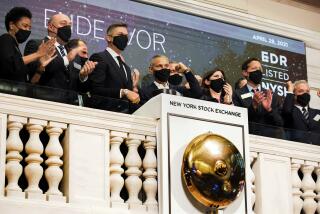United Air Has Good Reason to Be High Flier
- Share via
Here we go again. The stock of UAL Corp., holding company of United Airlines, rose Tuesday--up $6.75 to $146 a share, continuing a steady, two-week rise on takeover rumors.
Robert M. Bass was mentioned in Tuesday’s rumor--no big deal, since one or another of Ft. Worth’s Bass family is mentioned almost daily in connection with takeovers. But other suspects were mentioned also. Pan American World Airways, which recently lost a bid to take over Northwest Airlines’ holding company NWA, seemed a natural bidder for United. Pan Am enjoys backing from the Basses and from the investment bank Lazard Freres. And there was speculation about the intentions of investor Saul P. Steinberg, who owns 6.9% of UAL, and of the company’s own management.
Nobody was commenting publicly, but one man who backed Pan Am’s bid for NWA observed that “the strategic benefits we perceived for Pan Am with one airline obviously would be there with other airlines.”
What does it all mean? It means that some smart people see a valuable franchise in United Airlines, the second-largest domestic carrier after American, and so the next few weeks may see a bidding contest for UAL stock.
In one sense that may be surprising because United has been there before. Two years ago, when the UAL holding company was named Allegis, United Airlines was the subject of a fierce buyout battle that pitted the management of then-Chairman Richard J. Ferris against the airline’s own pilots. The pilots, and outside investors, objected to Ferris’ plan to turn UAL into a travel conglomerate through such acquisitions as Hertz Rent-a-Car.
Price Close to $4 Billion
Ultimately, the company avoided takeover, and Ferris was forced out--but the settlement was expensive. UAL sold its non-airline assets and paid $2.8 billion to buy back 61% of its stock from shareholders, with the result that the company today has $2 billion in debt and looks financially burdened.
But in another sense, United is like the ever-filling porridge bowl in the Grimm fairy tale. At the time of the 1987 buyout battle, the company was said to be worth $5.5 billion. Yet despite having distributed $2.8 billion to shareholders, today’s market estimates price it close to $4 billion.
How come? For one thing, airlines are hot. Last week, NWA was sold for $3.6 billion, a price that represented seven times its cash flow. If UAL sold at that same ratio to cash flow, its price would be about $290 a share, or a total market value of $6 billion. If you think as professional financiers do, you subtract UAL’s $2-billion debt from that market value to arrive at $4 billion-plus for today’s company.
Is the value real, or only speculative? It’s real--a major franchise in a growing business. Like all airlines, and most companies of any kind, United has a mix of valuable assets--some built by its own wits, and others that were handed to it through public policy. On the one hand, United originated the Apollo computer reservation system, which it now owns in partnership with Europe’s leading airlines. United’s portion alone is probably worth $750 million--so ingenuity has its rewards.
On the other hand, United’s landing rights at crowded airports, such as Chicago’s O’Hare, Washington’s National and New York’s LaGuardia, are worth a lot of money these days--perhaps $15 million per gate. But that’s a windfall of public policy. Landing rights assigned by government when airlines were regulated can be sold for private profit under deregulation--”all without paying a windfall profits tax,” remarks one airline expert. Small wonder the smart money is attracted to the business.
BUT MORE THAN THIS ASSET OR THAT, THE REAL FORCE PUSHmarket.
That is why KLM Royal Dutch Airlines invested $400 million in last week’s acquisition of NWA (KLM took non-voting stock so as not to challenge federal rules limiting foreign ownership of U.S. airlines). And that is why British Airways has a joint marketing agreement with United and would probably join any takeover effort if its ties were threatened by other foreign bids.
So what’s likely to happen? United’s management will probably be replaced once again. Current Chairman Stephen N. Wolf, like Ferris before him, hasn’t made peace with the airline’s pilots; labor relations are poor. That could open the door for Pan Am, a down-at-the-heels shell of the once big airline that has big money backing because its chairman, Thomas G. Plaskett, is a smart cookie--the man who invented the frequent-flier program years ago at American Airlines.
One way or another he may end up running United, which one way or another may get bought out in the coming weeks. Stay tuned.
More to Read
Inside the business of entertainment
The Wide Shot brings you news, analysis and insights on everything from streaming wars to production — and what it all means for the future.
You may occasionally receive promotional content from the Los Angeles Times.









